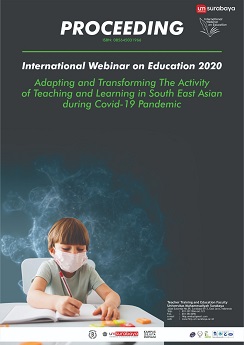The study of ICT-use bybiology students before distance learning takes place during COVID-19 pandemic
Abstrak
Abstract.
The study was carried out before the pandemic Covid-19 broke out, changing the
course of lectures into distance learning. The initial idea of this study was to determine the intensity and familiarity of prospective Biology teacher students and their descriptions of how they used the Software in lecturing and completing Blended learning-based Microteaching assignments. This study also wants to illustrate the familiarity of respondents from some software that supports learning and teaching in Microteaching courses. All 71 respondents were undergraduate students, 88.7% were female, and 11.3% were male, aged between 18-23 years. Students must work on assignments given at the beginning of the semester to conduct teaching simulation (microteaching). Through this activity, students will gain their own experience to prepare their performance in microteaching, such as arranging lesson plans, developing learning media, and making presentations that are appropriate for their class. Therefore, the data collected meets the requirements for analysis using statistical Software. The study found that pre-service Biology teacher students have a high preference for the use of Android-based smartphones, Whatsapp, and internet cellular connectivity to fulfill their course work. The benefits of this research are media information or application materials that can be used in distance learning
Referensi
N. Law, "Teacher skills and knowledge for technology integration,"Int. Encycl. Educ., 2010.
Dinar Wahyuni, "Improvement of teacher competence towards industrial revolution era 4.0,"Pus. Penelit. Badan Keahlian DPR RI, vol. 10, no. 24, 2018.
E. B. Bitok, "Teachers' Preparedness in Integrating Information and Communication Technology in Biology Classrooms in Uasin Gishu County, Kenya,"J. Res. Method Educ., vol. 4, no. 6, pp. 45–53, 2014.
J. Tondeur, N. P. Roblin, J. Van Braak, and J. Voogt, "Preparing beginning teachers for technology integration in education : ready for take-off ?,"Technol. Pedagog. Educ. ISSN, vol. 5139, no. June, 2016.
D. A. Thomas Conelly, Phillip Sharp, A New Biology
for the 21 st Century, 13th ed. Washington DC: The National Academic Press, 2009.
M. Kubiatko, G. Torkar, and L. Rovnanova, ―The Teacher as One of the Factors Influencing Students ‘ Perception of Biology as a School Subject UÄitelji _ ce kot en od vplivnih dejavnikov uÄenÄeve _ kine percepcije predmeta biologija,‖ vol. 7, pp. 127–140, 2017.
R. Agustin and L. Liliasari, "Pre-service science teachers' readiness to integrate an exploration toward TPACK (in preliminary practical context),"J. Math. Sci. Learn., 2016.
T. Valtonen, S. Hacklin, S. Kontkanen, A. Hartikainen-ahia, and S. Kärkkäinen, "Computers
& Education Pre-service teachers' experiences of using social software applications for collaborative inquiry,"Comput. Educ., vol. 69, pp. 85–95, 2013.
F. Aladejana, "Blended Learning and Improved Biology Teaching in the Nigerian Secondary Schools,"Proc. World Congr. Eng. Comput. Sci., no. October, 2008.
K. Potyrala, "Ict tools in biology education,"Technol. Their Appl. Educ., vol. I, 2003.
J. Kola, "Effective Teaching and Learning in Science Education through Information and Communication Technology [ ICT ]," vol. 2, no. 5, pp. 43–47, 2013.
Y. Gunay, B. Cavas, and H. Hamurcu, "Pre-service Teachers' Views on the Environmental Education, Human Brain and Genetics, Health and Sexual Education,"Procedia - Soc. Behav. Sci., vol. 167, pp. 141–151, 2015.
M. L. Hidayat, "The Modification of LMS Quipperschool to Improve Senior High School Students'Conce pt Mastery of Biology Subject , Topic : Human Reproduction Health,"J. Educ. Sci. Technol. (EST), 4(1), 32-38., vol. 4, no. 1, pp. 32–38, 2018.
" 'What Is Ict? | Igcse Ict.'‖ [Online]. Available:
https://www.igcseict.info/theory/0/ict/index.html.
UNESCO, ―Using ICT to Develop Literacy,‖ 2006.
M. İ.Ümit Yapici & Hevedanli, ―Pre-Service Biology Teachers ‘ Attitudes towards ICT Using In Biology Pre-Service Biology Teachers ‘ Attitudes towards ICT Using In Biology Teaching,‖ Procedia - Soc. Behav. Sci., no. May 2014, pp. 633 – 638, 2012.
J. Voogt, P. Fisser, N. P. Roblin, J. Tondeur, and J. Van Braak, ―Technological pedagogical
content knowledge – a review of the literature,‖ pp. 1–13, 2012.
E. Instefjord and E. Munthe, ―Preparing pre-service teachers to integrate technology : an analysis of the emphasis on digital competence in teacher education curricula,‖ vol. 9768, no. October, 2015.
F. Polly, D., Mims, C., Shepherd, C. E., & Inan, ―Evidence of impact: Transforming teacher education with preparing tomorrow‘s teachers to teach with technology (PT3) grants.,‖ Teach. Teach. Educ., vol. 26, no. 4, pp. 863–870, 2010.
R. Kay, ―Evaluating strategies used to incorporate technology into pre-service educa- tion: A review of the literature.,‖ J. Res. Technol. Educ., vol. 38, pp. 383–408., 2006.
M. J. Mishra, P. & Koehler, ―Technological pedagogical content knowledge: A framework for teacher knowledge.,‖ Teach. Coll. Rec., vol. 108, no. 6, pp. 1017–1054, 2006.
S. Kim, ―Technological , Pedagogical , and Content Knowledge ( TPACK ) and Beliefs of Preservice Secondary Mathematics Teachers : Examining the Relationships,‖ vol. 14, no. 10, 2018.
A. Ngampornchai, ―Students ‘ acceptance and readiness for E-learning in Northeastern Thailand,‖ Int. J. Educ. Technol. High. Educ., 2016.
J. Lasauskiene and A. Rauduvaite, ―Project-Based Learning at University : Teaching Experiences of Lecturers,‖ Procedia - Soc. Behav. Sci., vol. 197, no. February, pp. 788–792, 2015.
K. C. Dewi, P. I. Ciptayani, H. D. Surjono, and Priyanto, ―Critical Success Factor for Implementing Vocational Blended Learning,‖ J. Phys. Conf. Ser., vol. 953, no. 1, 2018.
M. L. Hidayat, ―Kajian Manajemen Sistem Belajar Quipper School sebagai Learning Management System,‖ Academia.edu, pp. 1–15, 2016.
S. B. Dias and J. A. Diniz, ―Towards an Enhanced Learning Management System for Blended Learning in High,‖ vol. 17, pp. 307–319, 2014.






